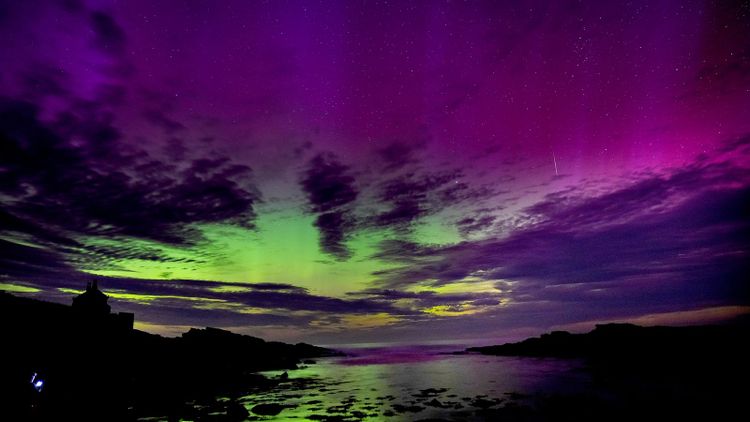Northern lights and spectacular meteor shower make night sky glow - will they appear again tonight?

English skywatchers in the UK had an unexpected surprise last night when they witnessed the Northern Lights in addition to the Perseids meteor shower.

The Perseids meteor shower, known as the "top meteor shower of the year" by NASA, reached its highest point during the night on Monday.
This meant that people who enjoy looking at the stars could see as many as 100 shooting stars in an hour, as our planet moved through the densest part of the leftover particles that create these shooting stars.
When looking at the stars, it's typically best to have clear, very dark skies. However, the stunning sight of the aurora borealis created some captivating photo opportunities.
A hiker who saw the scenery from his tent in Scaladale, Scotland described it as "truly enchanting" in a blog post on X.

This blog post is brought to you by X, who may be utilizing cookies and other technologies. In order to display this content, we require your permission to use cookies. You can adjust your preferences and choose to enable X cookies or allow them for this session only using the buttons below. You have the option to change your settings at any time through the Privacy Options. We are currently unable to confirm if you have agreed to X cookies. To access this content, simply click the button below to allow X cookies for this session.
The sun is currently at the peak of its 11-year cycle, causing an increase in sightings of the northern lights in the UK.

In May, there were amazing light shows in the sky for people in the UK to enjoy, with colors like pink and green filling the air.
The sky lights up when energec particles from the sun meet Earth's atmosphere.
If you're closer to the North Pole, you have a better chance of seeing the northern lights. However, sometimes they can be visible even further south.
Explore more content from Sky News: Encouragement for pregnant women to receive the vaccine, dilemma faced by astronauts stranded in space until 2025, and surprising findings on the intelligence of horses.

Yesterday evening, individuals in Cornwall and even further south observed the Perseid meteors streaking across the sky in conjunction with the aurora.
This blog content is brought to you by X and may use cookies and other technologies. In order to display this content, we require your consent to use cookies. You can customize your preferences by using the options below to enable X cookies or to allow them temporarily. You have the ability to adjust your settings at any time through the Privacy Options. We are currently unable to confirm if you have given consent for X cookies. To access this content, you can use the button below to permit X cookies for this session only.

"Yesterday evening, I went to #Polzeath to see the Perseid Meteor Shower, but I ended up staying until after 1am watching the northern lights! The sky was incredibly clear and the show was amazing!" shared Tom Kempster on X.
The exhibit was viewed worldwide, showcasing stunning photographs captured in various locations like Germany and Russia.
Are we going to see the aurora borealis in the UK tonight?
As per the Met Office, the solar plasma burst responsible for the southern appearance of the northern lights will gradually decrease until Tuesday, August 13th.

With that being said, there is a possibility of seeing the aurora in Scotland and some areas of northern England tonight.
Stay updated with the latest news by following Sky News on WhatsApp!
Stay informed about the newest updates from the UK and internationally by staying connected with Sky News.
Tomorrow, the activity will go back to normal levels. There is not expected to be any significant improvements and any visible aurora will only be seen in far northern Scotland.









































